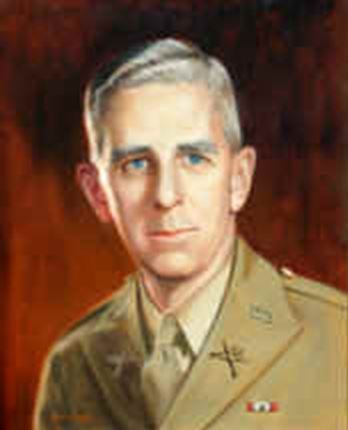- Brigadier General
- WW I and WW II
Biography
Brigadier General Elliott R. Thorpe was a native of Westerly, Rhode Island and a 1915 graduate of Westerly High School. Elliott entered Rhode Island State College (now the University of Rhode Island) in the fall of 1915 and enrolled in the Army ROTC program. Elliott attended college for one year as a mechanical engineering student before enlisting in the U.S. Army in 1916.
Brigadier General Thorpe’s military career encompassed two world wars, the reconstruction of Japan, and a tour of duty in post-war Thailand. He was the chief of counterintelligence under General Douglas MacArthur. As a First Lieutenant, he stood guard in the Hall of Mirrors in Versailles when the World War I treaty was signed on 28 June 1919. In 1945, he was on the USS Missouri in Tokyo Bay when the Japanese surrendered to General Douglas Macarthur.
While these were momentous and singular events, Lieutenant Colonel Thorpe’s unheeded warning about the Pearl Harbor attack of 7 December 1941 was arguably his most memorable moment. Serving as a military attaché in Dutch controlled Java (Netherlands Indies) in 1941 when the Dutch broke a Japanese diplomatic code, Lieutenant Colonel Thorpe was informed that intercepted messages referred to planned Japanese attacks on Hawaii, the Philippines and Thailand. He immediately cabled the information to Washington, but this warning was ignored. A week later, the Japanese attacked Pearl Harbor.
In 1943, Colonel Thorpe was knighted in the Order of Orange-Nassau by Queen Wilhelmina of the Netherlands for his work as American Liaison in the Netherlands Indies. In 1945, he was promoted to Brigadier General. As General MacArthur’s chief of civil intelligence in postwar Japan, Brigadier General Thorpe played a major role in reorganizing Japanese society. He set up a screening system to keep militarists out of the Japanese Government, supervised the release of political prisoners and helped determine which Japanese officials should be tried as war criminals.
After his service in Japan, Brigadier General Thorpe established the Army Language School and was the Military Attaché in Thailand. He was honored in 1949 with the title of Knight Commander in the Most Noble Order of the Crown of Thailand for his work as the Military Attaché of the American Embassy in Bangkok. Brigadier General Thorpe retired in 1949 after serving 32 years in the US Army. In 1969, he wrote “East Wind, Rain,” an account of his years as an intelligence officer.
Although he did not graduate from Rhode Island State College (URI), he always considered himself an alumnus and was very supportive of efforts to build an adequate campus student activity center. The post-war campus burgeoned, and extra space for the students was added to the campus by using numerous Quonset huts. One of these huts also served as the Student Activity Center.
He supported a fundraising effort for the construction of a War Memorial Student Union by donating his veteran’s bonus check. He also served as guest speaker at a benefit dinner at the Sheraton Biltmore Hotel in Providence, Rhode Island. The War Memorial Student Union was built in 1950, largely through fund raising efforts spearheaded by Brigadier General Thorpe and other alumni.
In 1946, Brigadier General Thorpe presented Rhode Island State College (URI) with a Japanese Temple Gong which was meant to be displayed in the Memorial Union. The gong disappeared shortly after its receipt. While efforts were made to recover the gong, it was never found. Photographs and typescript translations of the gong’s inscriptions are all that remain.
Brigadier General Thorpe also donated a ceremonial sword surrendered to him by Major General Yoshio Nasu of the Imperial Japanese Army on the occasion of the Japanese surrender aboard the USS Missouri. In 1969, Brigadier General Thorpe presented an autographed copy of his memoir East Wind Rain to the University of Rhode Island. Both the sword and the book are presently kept in the URI Library’s Special Collections Reading Room.
On 11 June 1951, Brigadier General Elliott R. Thorpe received an honorary degree of Doctor of Humane Letters during the institution’s first commencement as the University of Rhode Island. In 1952, Brigadier General Thorpe was the endorsed Republican candidate for the U.S. House of Representatives. He abruptly withdrew because of an investigation by the U.S. Army’s Counter Intelligence Corps questioning his loyalty. He indignantly felt that the investigation had been politically motivated.
The investigation had been a misunderstanding resulting from a 1951 speech addressing the Rhode Island Turkey Growers and Poultry Growers Association in which he criticized the shortage of food growing areas in Japan and the corruption in the nationalistic Chinese regime of Chiang Kai-shek. He also called for “a greater respect for freedom of speech in America as long as it is not subversive.” (Westerly Sun, 21 August 1952) After a public outcry, the Army quickly cleared Brigadier General Thorpe and apologized for the unwarranted investigation.
Brigadier General Thorpe retired to Sarasota, Florida in 1960. During his retirement, he served as Commissioner with the Whitfield Volunteer Fire Department. Brigadier General Thorpe continued to be in demand as a speaker and was sought for interviews by historians and journalists for his first hand account of post-war Japan. Shortly before his death, Brigadier General Thorpe was interviewed for the 1989 British Broadcasting Company’s production of Sacrifice at Pearl Harbor. He is also quoted in John W. Dower’s 1999 Pulitzer Prize winning book Embracing Defeat: Japan in the Wake of World War II.
Brigadier General Thorpe spent his entire life serving his community and nation during peace and war. His exemplary devotion to duty, personal bravery and outstanding leadership is in the highest traditions of the military service and reflect great credit upon himself, his family and the University of Rhode Island.
Brigadier General Elliott R. Thorpe died in 1989 and was buried with full military honors in Arlington National Cemetery, Arlington, Virginia.
Education
1919

